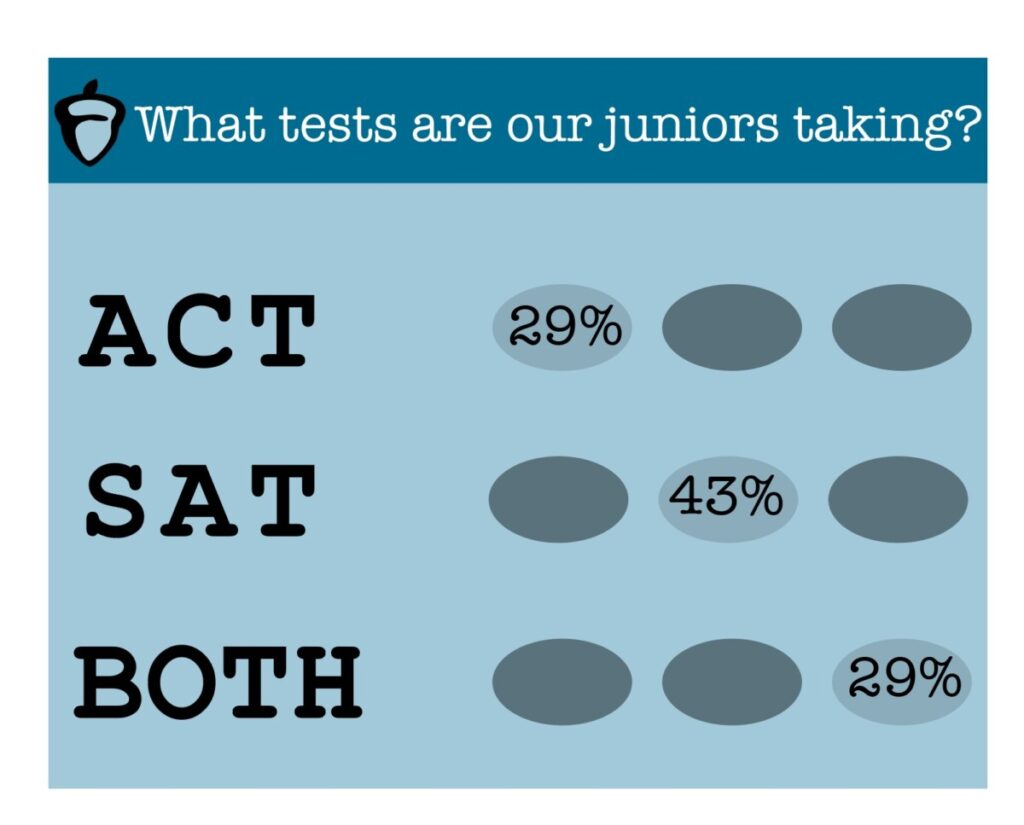Abbie Dymond, Executive Editor
@abbiedcourant
Number two pencils, eraser shavings, calculators, and crammed study hours. For many juniors, this is what they are embarking upon as standardized testing season quickly approaches. Undoubtedly, students want to score as high as possible on whichever test they take; however, knowing the difference between the two is the first step in achieving an impressive score. With the stigma around the Scholastic Aptitude Test (SAT) and American College Test (ACT) having drastically changed post-pandemic, it is important that students know which test is best and when submitting their scores will work to their advantage.
Knowing how to first tackle the SAT and ACT is critical, and the best way to set groundwork is by taking a practice test. “Most of the time, something like 80% of the time, the scores that a student takes on the practice SAT (PSAT) and practice ACT (PACT) are very similar, however, there are some students who get a much better score on the ACT or on the SAT,” school counselor Ann Vernon said.
Sometimes a student’s practice test may not align with their classroom performance, which can be a good indicator of what test to take. “If you feel like your PSAT score was unusually low for you and doesn’t line up with your other academic achievements, you should try a PACT,” Ms. Vernon said.
Since colleges have no preference between the tests, being familiar with the similarities and differences between them is an important step in determining which test is best for you. “Both tests are just under four hours, however, the ACT is a little shorter than the SAT,” college and career counselor Susan Carroll said. “The ACT does the math section slightly differently than the SAT, and it also has a science component. The science isn’t really testing you on something like physics, biology, or chemistry. It’s more like graphing and more general science questions. The only time you would find science on the SAT is if a writing section happened to be about a scientific topic.”

Another important difference between the two tests is the timing and the depth of questions. “The ACT goes at a faster pace, but the questions don’t go into a lot of depth the way they do on the SAT,” Ms. Vernon said. “The ACT is much broader than the SAT, so it requires a broader range of math problems, but it doesn’t go as much into depth in the math section, for example.”
Knowing your strengths and weaknesses as a student is also another way to decide what test to take. “I chose the SAT over the ACT because I naturally find myself to be stronger in English and math rather than science which is also included on the ACT,” junior Hadley Walker said.
For students who are on the path to becoming collegiate athletes, the schools they are interested in may also influence which test they’re taking. “For lacrosse recruiting specifically, Ivy League schools use what they call the Ivy Index, which is a combination of your unweighted GPA and ACT or SAT score,” junior Gray Tamasco said. “I don’t know how they calculate it, but I just know that obviously when one’s higher, the score goes up. The ACT counts more towards that index. So I think just knowing that, and knowing that I did better on the ACT anyway, it made choosing which test to take much easier.”
While it is important to take each test you take seriously, it is also important to note that post-pandemic, the emphasis on the tests has changed, putting more of a spotlight on other aspects of a student’s application. “I like for students to spend the first semester of their junior year focusing on their grades and their academics and doing the best that they can in their classes,” Ms. Vernon said. “If they had the SAT or ACT to study for at that time, I think it’s a lot. In my view, it takes away from the most important things they’re doing in school, and the tests are relatively less important than grades.”
Despite the alleviated pressure on the tests, some students are still trying to take the tests earlier than necessary, which negatively affects their future application process. “There are still a lot of people who are trying to take the ACT or SAT too early,” Ms. Vernon said. “Sophomore year is way too early. The tests are now based on their high school curriculum, so it doesn’t make sense for most students to take it sophomore year. There are also a few colleges that want to see every score that you receive. You don’t want them to think you took it more than three times because that’s a negative.”
Similarly, Ms. Carroll believes that students should focus more on their academics than super scoring on standardized tests. “Interestingly, I was listening to a webinar a year ago with a number of college representatives from prestigious colleges, and they said that the scores were the last things they looked at, so kids should not fixate on their scores,” Ms. Carroll said. “If you’re going to fixate on anything, it should be your GPA and the courses you select to take, especially during your junior and senior year.”
Another aspect of the college admissions process that has changed post-pandemic regarding standardized tests is that many schools are now test-optional. “Eighty percent of colleges allow the student to decide whether or not to submit their scores,” Ms. Carroll said. “That’s over 1800 colleges. So the student is really in the driver’s seat here.”
Additionally, post-pandemic, the average SAT or ACT score for a school has gone up, making it harder to determine when a student should submit their scores. “Every college will publish its middle 50% of scores from accepted students,” Ms. Vernon said. “If your score is at the middle of that range or above, a good rule of thumb is to submit them. However, with the introduction of test-optional policies, we’re finding that the middle 50% of scores is moving up because the people who aren’t happy with their scores don’t tend to submit them.”
If a student receives a score that doesn’t align with their normal academic performance, they may be able to take advantage of the test-optional policy. “Take the SAT or ACT a couple of times, but at the end of the day, it’s not necessary to submit scores you are not satisfied with, especially if your transcript shows you to be a stellar student,” Ms. Vernon said.




